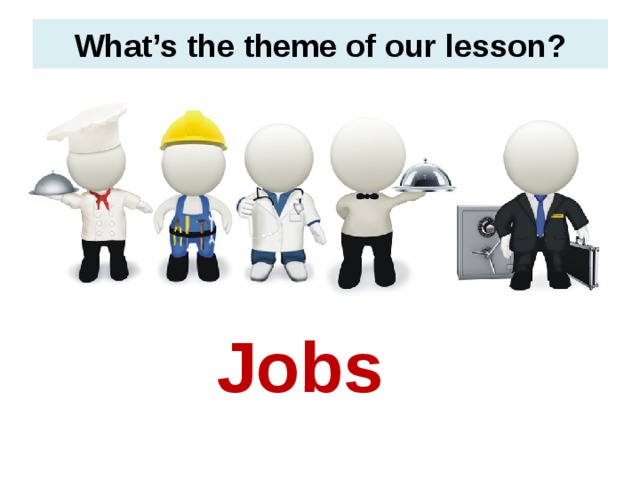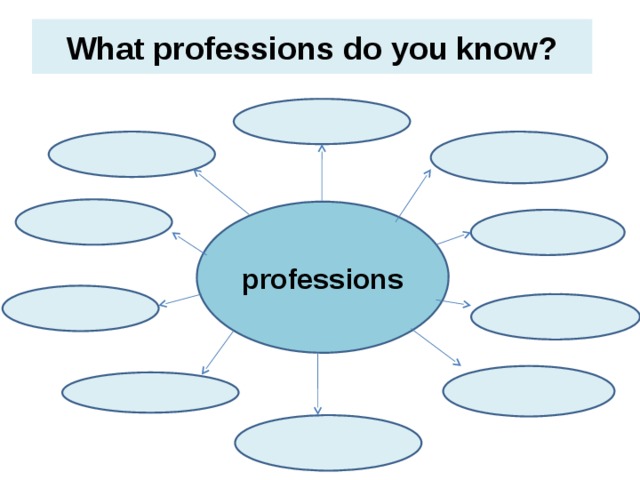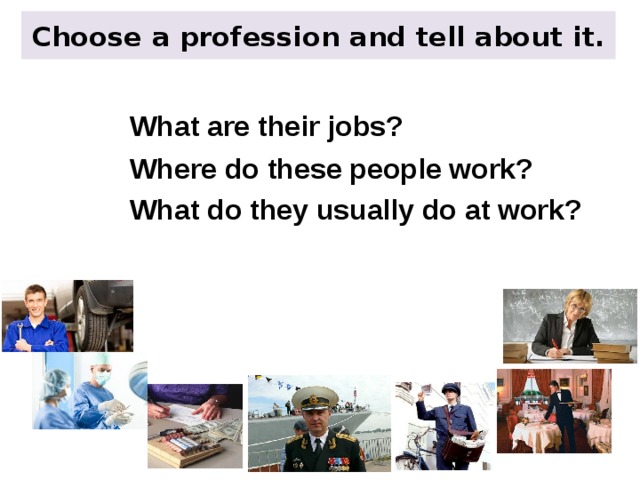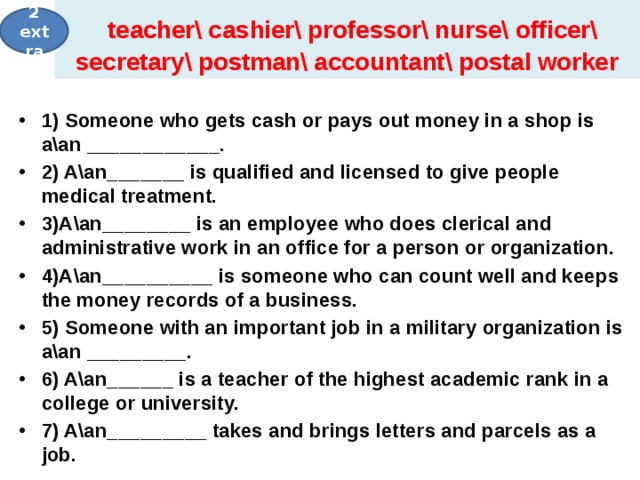Профессии лексика по теме комарова 9 класс конспект
Обновлено: 06.07.2024
- формирование коммуникативной компетентности в общении и сотрудничестве со сверстниками.
- осуществление регулятивных действий самонаблюдения, самоконтроля, самооценки в процессе коммуникативной деятельности на иностранном языке.
- выбор наиболее рациональной последовательности по выполнению учебной задачи.
- построение логических рассуждений, включающее установление причинно-следственных связей;
- формулировка собственного мнения и позиции, способность аргументировать и координировать её с позициями партнёров в сотрудничестве при выработке общего решения в совместной деятельности;
- адекватно использовать речевые средства для решения различных коммуникативных задач;
- осуществление коммуникации в малых и больших группах; понимание на слух речи учителя и одноклассников;
- адекватное использование речевой деятельности при решении речевых задач.
Индивидуальная, парная, групповая, фронтальная.
технология коммуникативного обучения иноязычной культуре,
Бим И. Л. Шаги 5: Учебник для 9 кл.,
аудиокурс к учебнику,
Ход урока
Деятельность
Деятельность
Развиваемые
Мотивация (самоопределение) к учебной деятельности
Учитель приветствует учащихся, обращает внимание на экран ( Слайд № 1 ).
Ученики называют тему урока. Формулируют цель.
Коммуникативные УУД: формирует своё мнение, аргументирует свою точку зрения
Регулятивные УУД: целеполагание


II этап. Актуализация и фиксирование индивидуального затруднения в пробном учебном действии.
Организует работу по совершенствованию лексического навыка говорения:
Wir wiederholen die Wörter! Findet die richtige Übersetzung! ( Слайды № 3 – 4)
Findet die passenden Teile der Wörter! ( Слайд № 5 )
Verteilt die folgenden Berufe richtig ( Слайд № 6 )
Welche Berufe bevorzu gt ihr?
Выполняют задания ( Слайды № 3 – 6 )
Отвечают на вопрос.
Коммуникативные УУД : умение структурировать знания и умения;
Личностные УУД : саморегуляция




Этап закрепления с проговариванием во внешней речи.
Организует работу по обучению аудированию:
- Nicht alle Jugendlichen wählen ihren Beruf schon in der Schule. Wie es manchmal so ist, wird in einem „JUMA“-Artikel erzählt, “Wende durch den Freund”. Hört den Text und formuliert den Hauptgedanken.
- Hört noch einmal zu und sagt Wieviel Teile hat der Text?
- Hört euch den Text noch einmal an und beantwortet kurz die Fragen:
Wie lernte Annette in der Schule ?
Wie verstand sie sich mit den Eltern ?
Wann ä nderte sich ihr Leben ?
Hatte ihr Freund einen positiven oder negativen Einfluß auf sie?
Woran nahm Annette in Bonn teil ?
Welchen Berufsbereich w ä hlte sie ?
Wo fand sie einen Arbeitsplatz?
Проводит гимнастику для глаз.
Слушают, делают пометки, отвечают на вопросы учителя.
Отвечают на вопросы.
Выполняют г имнастику, используя тренажер В.Ф. Базарного для снятия усталости глаз.
смыслообразование, нравственно-этическое оценивание
Познавательные УУД : логические действия, работа с прослушанным текстом;
Коммуникативные УУД : адекватно использовать речевые средства для решения коммуникативных задач, построение речевых высказываний;
Регулятивные УУД : контроль, коррекция, оценка.
Этап включения изученного в систему знаний.
Организует работу по совершенствованию навыков говорения:
- Und es ist die Zeit, eure Projekte zu presentieren.
- Könnt ihr über eure eigene Zukunftspläne sprechen? Nehmt bitte die Tabelle und dieses Schema zu Hilfe ( Учебник стр . 145-146, Слайд № 7 ).
Учащиеся представляют творческие проекты-презентации.
Рассказывают о своих планах на будущее, пользуясь таблицей с ключевыми словами и выражениями в учебнике, а также схемой на Слайде № 7 .
Познавательные УУД : умение структурировать знания, оценка процессов результатов деятельности.
Коммуникативные УУД : применение полученных знаний.
Регулятивные УУД : самоконтроль, волевая деятельность, оценка.

Этап рефлексии учебной деятельности на уроке.
- So, Kinder, wir haben heute viel gearbeitet. War die Stunde interessant für euch? Was haben wir heute in der Stunde gemacht? Schätzt euch ein!
Sagt mir bitte ihre Noten ( выставление оценок ).
Комментируют урок, оценивают свою работу на уроке, делают выводы для себя.
Записывают домашнее задание в дневники.
Коммуникативные УУД : выражение собственной позиции, аргументация собственного мнения;
- Для учеников 1-11 классов и дошкольников
- Бесплатные сертификаты учителям и участникам
МУНИЦИПАЛЬНОЕ БЮДЖЕТНОЕ ОБЩЕОБРАЗОВАТЕЛЬНОЕ УЧРЕЖДЕНИЕ
МЕЧЕТИНСКАЯ СРЕДНЯЯ ОБЩЕОБРАЗОВАТЕЛЬНАЯ ШКОЛА
ЗЕРНОГРАДСКОГО РАЙОНА

План-конспект
английского языка в 9 классе


Подготовила: Усанова
София Степановна учитель английского языка
высшая квалификационная категория
ст. Мечётинская
План- конспект урока английского языка в 9 классе.
Тема: Цикл 5. Мир профессий. Выбор профессии : “ Choosing a Career : The World of Jobs ”. Цель урока : развивать навыки монологической речи по теме “Выбор профессии”; совершенствовать лексические навыки и расширить лексический запас учащихся. Задачи урока : Образовательные: развивать навыки монологической устной и письменной речи; активизировать ранее изученную лексику по теме “Профессия и успех” в устной и письменной речи; развивать навыки аудирования, умение общаться на английском языке. Развивающие: развивать интеллектуальные способности учащихся; формировать умение выделять главное, сравнивать и анализировать. Воспитательные: развивать у учащихся самостоятельность мышления; содействовать профориентации учащихся. Тип урока: повторение и закрепление полученных знаний с использованием информационных технологий. Оборудование: Мультимедиа - презентация; раздаточный материал.
ХОД УРОКА
Teacher: Today we’re going to talk about the world of professions. You will do some lexical exercises to improve your speech. At the end of our lesson I will help you to choose the profession suitable for you. It will help you to write a composition “My future profession”.
II . Фонетическая зарядка
учащиеся тренируются в чтении существительных и прилагательных.
Teacher: Let’s do a phonetic drill first. Look at the blackboard and read the words which end with suffixes:
NOUNS: -cian physician , -ist physicist, -er photographer, programmer, manager, cashier, teacher, fashion designer, bricklayer, bus driver -or conductor, tailor ant accountant
ADJECTIVES: -al rational, practical -ive communicative, creative -ic artistic -ful helpful -able sociable
Other helpful words: prestigious, organized, observant, reliable, imaginative, humanities
b) Introduction Conversation
1. What do you want to be when you grow up? 2. What is important in choosing a profession? Do you want to have a well-paid job or low-paid but interesting job for you profession? 3. What professional field can you work in? 4. What subjects are you good at?
III . ОСНОВНАЯ ЧАСТЬ
1 . Активизация использования лексики. Игра “ Угадай профессию ”
Teacher: Now it’s time for a guessing-game “What profession is it?” I’ll describe you a profession and you will give me the word. Introduction Exercises
1. Here are some professions: journalist, bricklayer, accountant, physicist, sports instructor, interpreter, architect, manager, pharmacist, physician, announcer, receptionist, cashier, conductor, interior decorator, programmer, fashion designer.
Учитель описывает профессии, используя слова на доске.
Listen to the definitions of professions, try to guess and name them.
1. someone who can count well and keeps the money records of a business
2. someone who makes walls with bricks
3. someone who designs clothes
4. someone who writes computer programs
5. someone who stands in front of the group of musicians or singers and directs their playing or singing
6. someone who gets cash or pays out money in a shop
7. someone who works at the reception desk of a hotel
9. someone who changes spoken words from one language to another
10. someone whose job is to design buildings
11. someone whose job is to manage a company
12. someone who studies or works in physics
Затем учащиеся сами дают описание профессий. Задание приготовлено учащимися дома .
Now we are going to discuss the qualities of working people, their skills and abilities.
Tell me about yourselves, what skills and favourite subjects you have.
Are you the right person for the profession you have chosen? What kind of person are you?
Choose adjectives that you can use describe yourself.
polite elegant generous великодушный ambitious serious easygoing лёгкий unpleasant sociable clever creative forgetful careless funny adventurous friendly reliable надёжный practical shy enthusiastic talkative
3.Write a word you can use to describe someone who:
1) always keeps a promise- 8) always looks very smart-
2) is often unkind to other people- 9) makes a lot of silly mistakes-
3) doesn’t remember things- 10)has good manners-
4) thinks deeply about things- 11) likes giving thing to people-
5) likes to be around people- 12)shows a lot of excitement and eagerness-
6) is full of bright ideas- is always able to deal efficiently with problems
7) likes making people laugh- 14) doesn’t say much around other people-
4. Развитие лексических навыков . Увеличение объема используемых лексических единиц. Now we are going to recall these words. Answer my questions please. 1)What leisure activities do you know? 2)What activities are the most popular in Russia? 3)What do you enjoy? 4)What names of jobs do you know? 5)What are the most popular in Russia? 6)What professions are the most and the least paid in our country? 7)What jobs are the most interesting and uninteresting for you?
Take the lists with descriptions of many different jobs. First of all read them. Then match the sentences with names of jobs.
5. Lexical Test Choosing Your Future Profession Task: choose the suitable words.
1. A person whose job is to keep and examine the money accounts of business or people is called … 2. A person who plans new buildings and sees that they are built properly is called … . 3. A person who practices or works in one of the fine arts is called … . 4. A person who is skilled at making and repairing wooden objects is called … . 5. A scientist who specializes in chemistry is called … . 6. A person who prepares and cooks food is called … . 7. A person professionally trained to treat the teeth is called … . 8. A person who works at a dock is called … . 9. A person who drives a car is called … . 10. A person who plans and understands the making of machines, roads, bridges is called … . 11. A person who owns or plans the work on a farm is called … . 12. A person who changes speech from one language into another is called … . 13. A person whose profession journalism is called … . 14. A person whose business is to advise people about laws and to represent them in court is called … . 15. A worker in a mine is called … . 16. A person who performs on a musical instrument, or who writes music is called … . 17. A person qualified to practise both medicine and surgery is called … . 18. A person who studies physics is called … . 19. A person who flies an aircraft is called … . 20. A member of a navy, or sailor on a ship, who is not an officer is called … . 21. A person who makes or repairs shoes is called … . 22. A worker in iron or other metals is called … . 23. A man who serves passengers on a ship or plane is called … . 24. A person who makes garments ( одежда ) for men is called … . 25. A person who changes writing from one language into another is called … . 26. A person whose job is to weave cloth is called … .
For help: a) dentist, b) shoemaker, c) artist, d) tailor, e) accountant, f) driver, g) seaman, h) architect, I) physician, j) chemist, k) smith, l) docker, m) translator, n) farmer, o) carpenter, p) lawyer, g) steward, r) weaver, s) journalist, t) cook, u) physicist, v) interpreter, w) pilot, x) miner, y) musician, z) engineer.
6 . Give your definition of professions: bricklayer, teacher, accountant, driver, musician, singer, photographer, shop-assistant
7. Проверка домашнего задания Teacher: Your home task was to write a dialogue “My future profession.” I’d like you to read some examples of your dialogues. Ученики читают диалоги по ролям. Примерные вопросы учащихся друг к другу:
1. What would you like to do after school? 2. Was it your own decision? 3. Who helped you to make the decision? 4. What is your father by profession? 5. Is this profession important for society?
8 . Отработка и закрепление лексики по теме
Актуализация приемов дифференциации существительных (названий профессий) и прилагательных (характеристики) в письменной и устной речи.
Teacher: Now, it’s time to do our lexical exercises. Please, take your papers.
Exercise 1 . Look at the screen. Professions can be: prestigious, not prestigious, up-to-date, out-of-date, well-paid, low-paid, Intellectual/mental, Manual, rare and widespread.
Read the names of professions and divide them into groups.
photographer, school master, physician (doctor), conductor, bus driver, bricklayer ( каменщик ), tailor ( портной ), weaver ( ткач ), judge, shop-assistant, physicist, manager, accountant, programmer, fashion designer, architect.
Exercise 2. Look at the traits of character and name 2 or 3 professions in which they are necessary to use.
strength ( сила ) responsibility ( ответственность ) – (pilot)
reliability ( надежность ) – (judge) creativity ( творчество ) – (singer, photographer)
observation ( внимание к деталям ) – (judge) patience ( терпение ) – (teacher)
common sense – (doctor) logical mind – (programmer)
Exercise 3 . Work in pairs
Which characteristics are necessary for people of these professions: pilot, teacher, doctor (physician), physicist, sportsman, bricklayer, programmer, accountant.
Make up the sentences.
(A teacher should be patient, intellectual, loving children.)
Exercise 4. Look at the screen. You know that there are some professional fields: Sciences, Law, Architecture and Urban Planning, Environmental Science, Agriculture and Forestry, Journalism, Library and Information Science, Computer Science and so on. Each profession requires definite traits.
Match the fields on the left with the traits on the right.
a) imaginative, artistic, loving, big hearted
b) practical, active, energetic, organized.
c) logical, rational, fast-thinking, cool-headed
d) expressive, observant professions ( наблюдательный )
e) helpful, communicative, reliable.
Which type of profession would you choose – 1, 2, 3, 4, 5?
(I would choose art as a profession)
Exercise 5. Look at the ex. 4 and say what are the traits of your character? Write down your results to make a home essay.
(I am rather communicative,…)
IV. Подготовка к аудированию
Teacher: Now we are going to listen to how these people describe their everyday duties. Look at the screen and say what are the professions of these people.
Ученики смотрят на экран и называют : photographer, teacher, cook, judge, shop assistant, radio DJ.
Teacher: Say what they usually do every day?
Ученики описывают их профессиональные каждодневные обязанности.
Форма работы – индивидуальная.
V . Практика говорения
Teacher: Now you will listen to these people. Write down their professions.
Форма работы – индивидуальная .
Teacher: Are people always asking you what you want to be when you leave school? You know how difficult it is to choose a profession. Your traits and abilities are very important here.
VI. Подведение итогов урока . Выставление оценок
Учитель подводит итоги урока и оценивает работу учащихся.
Teacher: Let’s sum up. Today you have found out what kind of person you are and what profession is suitable for you. I hope this questionnaire will help you to make the right choice. At home please write a short essay (15 sentences) “My future profession”.

Цель: В конце урока учащиеся должны высказать собственную точку зрения или точку зрения, описанную в тексте, с опорой на вопросы.
Деятельность учителя
Деятельность учащихся
Организационный момент
Good morning, dear friends!
Today we are going to speak about clothes.
Активизация речевых навыков
And now, answer for my questions, please.
How are you today?
What`s date is it today?
What`s day is it today?
What`s the weather like today?
What`s is your favorite sweets?
What`s would you like to visit?
Do you like vegetables?
My favorite game is…
I would like to read…
Yes\No like (dis)like it.
Фонетическая разминка
Now, you should watch the video, listen and repeat after it. Write down 2-3 examples.
Основной этап
Предтекстовый этап – снятие языковых трудностей
In order to decide on the choice of a future profession, you need to decide what you can do and what you want. Open card 1.
Task 1. Translate the selected words and expressions from the text.
Sooner or later all of us face the problem of choosing a career when we are to decide what we are going to be in future. Choosing a career is not a simple matter — in fact, it can be one of the most important in our life. You don't need to hurry making a decision. You should examine thoroughly your abilities and character, take a realistic view of your strengths and weaknesses, pay attention to your parents' and friends' advice and take into account your own preferences. The last point in the list is particularly important because there are many examples when people make great mistakes choosing their future profession. Sometimes they either simply follow in the footsteps of their parents or relatives or just blindly follow their advice. Your choice should be mostly based on your own opinion. Family traditions are good, but your turn of mind may be quite different. So, never base only on other people's opinion.
Having thought carefully about what sort of person you are, try to work out a list of your occupation requirements.
Nowadays there is a great variety of jobs to any taste. Choosing a future career, we should consider the following things.
• Pay. Is the size of your salary important? Generally speaking, it is important. Of course there may be various situations, but if you are going to be independent, successful and wealthy, you have to find a well-paid job. Moreover, if you are going to have a family, you should be ready to support it, to be a breadwinner. Naturally, you'd like to live in good conditions, and your children to study at good schools, and then to enter prestigious universities, to travel all around the world and so on. Now you understand why you should take money into consideration when choosing a job.
• Further training, promotion prospects and job conditions should also be kept in mind. Just after graduating it is very difficult to find a plum job which will respond to all your preferences. It is usually a monotonous, tedious clerical job, but if you are a capable and hard-working person, you will certainly be offered an opportunity to climb the ladder.
• Place of work. You ought to decide whether you want to work indoors (cashier, chemist, librarian, secretary, etc.) or outdoors (driver, firefighter, estate agent, etc.). Your choice may be based on your lifestyle or health condition.
• Full-time, part-time, flexitime jobs. There is no set pattern to part-time working. It may involve a later start and earlier finish time than a full-time position, working mornings or afternoons only, fewer working days in a week for less salary. It is a perfect variant for students who want to juggle their studies and work, as well as flexitime jobs. Employees decide by themselves when to begin and end their working day.
• Communication with different people. Meeting and dealing with people doesn't appeal to every person. Some people are not very sociable; on the contrary, they are timid, shy and diffident. Frankly speaking, it is a great talent to have communication skills. If you think you have it, you may choose a profession involving close contacts with people, such as a doctor, a journalist, a lawyer, a guide, a teacher.
• Business trips. You should keep in mind that some professions imply travelling all over the world, such as tour guides, scientists, actors, journalists, pilots and so on. It's not always fun. Business trips may last a week, a month and even more. You may be sent to London for a few days, then you'll spend only a few hours in Paris, and right after that, without any rest, you'll have to go to Berlin. Sometimes it turns out that you don't have even an hour for yourself just to relax and see the town you've come to. Such trips may be very exhausting and stressful. However, if you are young, ambitious and full of energy, you will be able not only to do your job successfully but also see the world.
• Aspiration for creative work. If you are a creative person, it's a must for you to find such job. It can be a job of an artist, a tailor, a designer or a stylist.
• Jobs connected with risk. Such jobs are usually well-paid, but very dangerous. A police officer, a fireman, a bodyguard, a lifeguard — these are the names of jobs which imply risk. Those, who want a rewarding but demanding job and who are ready to devote all their lives to it, may choose this kind of work.
Analyzing all these points will help you not to make a wrong choice.
In case you are an aspiring, responsible, creative, optimistic, reliable person, who is ready to learn and be laborious, who is not afraid of any difficulties of the future and ready to solve any problem with a smile, the world of jobs and careers will be open to you.
Choosing a career should not only be a matter of future prestige and wealth. Work should bring real satisfaction; otherwise your whole life will become dull and monotonous.
Текстовый этап
Task 2. Read the text and title it.
Послетекстовый этап
Task 3. Answer questions about the text or based on your point of view.
Have you already thought about your future career? What makes the profession chosen so attractive for you?
2. Do your parents give you a piece of advice about your future profession?
3. What are your parents?
4. Have you got any traditions in your family? (connected with jobs)
5. Try to take a realistic view of your strengths and weaknesses. Which of your qualities are worth improving?
6. What part-time jobs can students do nowadays?
7 What occupations are popular nowadays in your country? Why?
Great! Thank you for your work, you were very active, it was such a pleasure to work with you. Especially I like the way… work today. Thanks for the lesson. See you later!
Пояснительная записка для учащихся:
Для того, чтобы определиться с выбором будущей профессии, необходимо определиться с тем, что вы умеете делать и чего вы хотите. Откройте карточку 1.
Задание 1. Переведите выделенные слова и выражения из текста.
Задание 2. Прочитайте текст и озаглавьте его.
Содержимое разработки
![An English proverb: Every man is an architect of his fortune. architect [ˈɑ:kɪtekt] fortune [ˈfɔ:tʃən]](https://fsd.intolimp.org/html/2017/10/01/i_59d13d04ba21d/img_phpMdw6Gr_1-OTKRYTYJ-UROK-_PROFESSII_0.jpg)
An English proverb:
- Every man is an architect of his fortune.
architect [ˈɑ:kɪtekt]
fortune [ˈfɔ:tʃən]

What’s the theme of our lesson?
Today at the lesson we will:
The aim of the lesson is:
Concept Wheel Name the synonyms to the word

What professions do you know?
professions

Choose a profession and tell about it.
What are their jobs?
Where do these people work?
What do they usually do at work?

teacher\ cashier\ professor\ nurse\ officer\ secretary\ postman\ accountant\ postal worker
4) Someone who can count well and keeps the money records of a business.
- 6) A teacher of the highest academic rank in a college or university.
2) A\an_______is qualified and licensed to give people medical treatment.
7) A\an_____ takes and brings letters and parcels as a job.
1) Someone who gets cash or pays out money in a shop.
3)A\an________is an employee who does clerical and administrative work in an office for a person or organization.
Читайте также:

